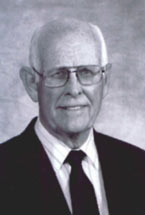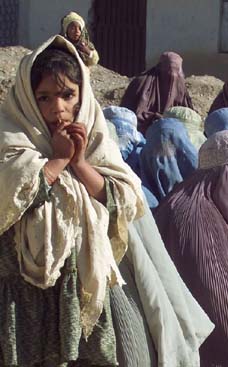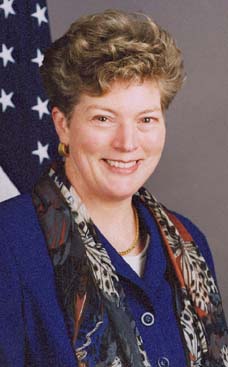
We couldn't believe how fast it was. Sargent Shriver, (President John F. Kennedy's) brother-in-law, put together a terrific team. Bill Moyers headed up PR for the program. Warren Wiggens, who had worked for USAID, organized everything. It was just amazing how organized it became. Sarg talked to everyone in Washington to get the Peace Corps funded.
Maurice Albertson remembers origins of Peace Corps
Study water, save the world with a volunteer corps
By Jane Albritton
August 15, 2008 --
Editor's note: Between Aug. 22 and 24, Fort Collins' Northside Aztlan Community Center will become the epicenter of Peace Corps & Friends: A Celebration. The weekend will feature activities, speakers, concerts and reunions of returned Peace Corps volunteers, in recognition of the pivotal role played in the development of the organization by Colorado State University.
NCBR writer Jane Albritton, who spent her Peace Corps years(1967-69) in India, sat down with Maurice Albertson, now professor emeritus for the CSU Engineering Department, for a wide-ranging interview about how he helped bring the international organization into being. She is also editing an anthology of volunteer stories, "Peace Corps at 50,"(www.peacecorpsat50.org) to be published for the organization's half-century anniversary in 2011, and will conduct a writing workshop for volunteers on Friday afternoon of the celebration.
NCBR: What originally brought you to Colorado State University after you completed your doctoral work in engineering at State University of Iowa (now the University of Iowa)?
Albertson: I came to Colorado State, which was then Colorado A&M, in 1947 with the job of developing a water resources research and graduate program. In 10 years we had the largest program in the world - starting from zero. We had inherited a campus lab from the Bureau of Land Reclamation where we could do model studies in hydrology. That research got us well acquainted with the international development that was taking place.
NCBR: How did you happen to get directly involved in international development?
Albertson: After World War II, the Marshall Plan pulled Europe out of a terrible situation. So the thinking was, "Why not do it with the rest of the world?" In the 1950s, there was a lot of money going into water resources, building dams and canals. That was also the time when the Southeast Asia Treaty Organization, SEATO, was set up in Bangkok, Thailand.
NCBR: But that was a military organization, wasn't it?
Albertson: Yes, it was. But the director said that there should be some non-military projects and that local students should be trained as engineers to lead the way with sustainable development. So the plan was to develop a graduate school for water resources. USAID (United States Agency for International Development) said they would find someone to run it.
NCBR: How did USAID find you in Fort Collins?
Albertson: They first went to MIT, and my colleagues there said, "Maury Albertson is the one you want." Then they went to Georgia Tech and then to Michigan. You see, they weren't accustomed to going west of the Mississippi. But when everyone said, "Talk to Maury," they finally asked me if I was interested. I said yes.
That was in November of 1958. Bill Morgan was president of the university, and he was in favor of my going. So I went over there in late January of 1959 and contacted the largest university in Thailand, Chulalongkorn University. They were enthusiastic. They gave me two buildings for classrooms and labs and built another one for our offices. That was the start of the SEATO Graduate School of Engineering.
My job was to bring in money, students and faculty each year. I had to get Australia and New Zealand to give us some money, along with the U.S. and UK. Initially, France declined because the language of instruction was English. But we finally brought them in.
NCBR: Is the school still operating?
Albertson: Oh, yes. Next year is the 60th anniversary. Since 1967 it has been an independent institution named the Asian Institute of Technology.
NCBR: So in the late 1950s, you had become deeply involved in international development and research. What did that mean at CSU?
Albertson: In 1958, Bill Morgan came to me and said, "80 percent of our grant money comes from you. You need to head up research for the whole university." So he set me up as director of the CSU Research Foundation.
NCBR: And was that about the time you got wind of the Peace Corps?
Albertson: Yes, only it wasn't called the Peace Corps at first. It was originally called the "4-Point Youth Corps," an idea tacked onto the Mutual Security Act. The idea was to send young people to work in developing countries. I knew that CSURF was the only organization in the country that could put together the report on "the advisability and practicability of the 4-Point Youth Corps." I recruited Pauline Birky and put together a proposal to get the contract from the State Department. It was only for $10,000.
NCBR: How did you get the contract?
Albertson: We knew we had terrible competition: the Stanford Research Institute and MIT wanted it. But we never let the people in Washington forget us. I was in Washington twice a month for meetings for other grants and research, and every time I was there I dropped in on Rep. Henry Reuss from Wisconsin or the people with the ICA (International Cooperation Agency) to keep them up to date on the ideas we had about the project. We were finally told we would get the contract, but it was months before we got the money.
NCBR: How were you able to work on the project?
Albertson: I wrote proposals to the Rosenthal Foundation and the Rockefeller Foundation. At that time Dean Rusk was director of the Rockefeller Foundation and organized a conference of top people to discuss the ideas our team had come up with. Then he gave us $5,000 to continue our work. The Rosenthal Foundation gave us $25,000.
(In her memoir, "Peace Corps Pioneer," Pauline Birky-Kreutzer noted that General Hershey, Director of Selective Service; Colin Bell, executive secretary of the American Friends Service Committee (Quaker); and Lewis Carliner, representing the United Auto Workers, were among those who participated in the conference.)
NCBR: So what did you do when you finally had a contract and the $10,000 in hand?
Albertson: The contract said we had to do a detailed study in at least 10 countries on three continents. I was able to combine my trip to the SEATO Graduate School of Engineering with stops in Pakistan and India. A member of our philosophy faculty, Dr. Manuel Davenport, had been invited by Albert Schweitzer to attend a workshop in Africa. So we paid his airfare, and he did our study on that continent. Pauline did the study in Latin America and the Caribbean.
NCBR: So you got the contract in 1960, you turned in the preliminary report in February 1961 and you had 400 volunteers in the field by the fall of the year.
Albertson: We couldn't believe how fast it was. Sargent Shriver, (President John F. Kennedy's) brother-in-law, put together a terrific team. Bill Moyers headed up PR for the program. Warren Wiggens, who had worked for USAID, organized everything. It was just amazing how organized it became. Sarg talked to everyone in Washington to get the Peace Corps funded.
NCBR: Your report, which later became the book "New Frontiers for American Youth: Perspective on the Peace Corps," was written by you, Pauline and Andrew Rice, who was based in Washington. Was that it for Colorado State?
Albertson: Oh, no. The logical step was for us to submit a proposal to train volunteers and to administer the programs overseas. We had faculty and programs well established in Pakistan, Iran and Thailand. We won the contract for Pakistan, and when the first director there didn't work out, Pauline went over and ran it. She was highly successful.
NCBR: Before the Peace Corps was established, detractors of the idea called it the "Children's Crusade" and "Kennedy's Kiddie Corps." Earlier this year, some 47 years later, there was a flurry of activity on the New York Times' Op Ed page and "Letters to the Editor" about whether the Peace Corps was really relevant to development in the 21st century. What do you think? Is the Peace Corps obsolete?
Albertson: Absolutely not! I talk with people from foreign countries all the time, and the one thing they are happy with, the one thing they think really represents the American people, is the Peace Corps. The greatest PR for the U.S. in the world is Peace Corps.
NCBR: Is there anything you can suggest that would improve it?
Albertson: Well, the government is not going to be able to keep it going unless they expand it. Presidents always talk big, but they won't push Congress to give it the money it needs. It needs to be much bigger, and there are plans for that to happen.
(The annual budget for the Peace Corps, originally under the Department of State but since 1981 an independent federal agency, is now $325 million.)
NCBR: Meanwhile, at age 90, you are continuing your work with sustainable development.
Albertson: Yes, I created Village Earth. It's a nonprofit organization based at the CSU Engineering Research Center. We are dedicated to promoting sustainable, community-based development around the world.













